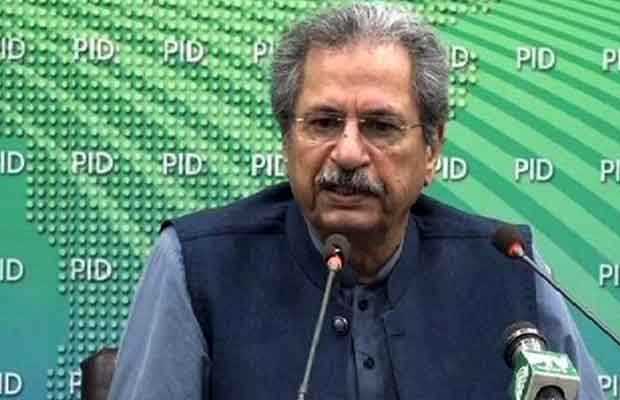Decision on educational institutions opening on March 24

Lahore: Federal Minister for Education, Professional Training, National Heritage and Culture Shafqat Mahmood has said that the third coronavirus wave is serious and it requires a careful decision.
All education/ health ministers will meet on Wednesday, March 24 at the National Command and Operation Center (NCOC), to take a decision regarding opening or further closure of educational institutions, he announced.
He said this in a meeting with business community and later talking to the media here at the Lahore Chamber of Commerce and Industry (LCCI) on Monday.
LCCI President Mian Tariq Misbah presided over the meeting, while Senior Vice President Nasir Hameed Khan and Vice President Tahir Manzoor Chaudhry, former LCCI president Mian Misbah-ur-Rehman, Provincial Minister for Higher Education Raja Yasir Humayun, former senior vice president Amjad Ali Jawa, LCCI Executive Committee Members Haji Muhammad Asif Sehar, Malik Riaz Iqbal, Zeshan Sohail Malik, Dr Riaz Ahmed, Wasif Yousaf and Fiaz Haider also spoke on the occasion.
The federal minister said that closure of educational institutions was a difficult decision as the previous lockdown had already caused heavy loss to the students.
He said that closure of educational institutions shifted the focus of students, adding that Ministry of Education wanted to open educational institutions.
About the Single National Curriculum (SNC), Shafqat said that it would improve educational standards for Pakistanis across the country irrespective of their socioeconomic class.
President Lahore Chamber of Commerce presents a shield to Federal Minister for Education Shafqat Mahmood at the Chamber of Commerce Office.
It would eliminate individualism as well as bring about equality and help get rid of division in society. “We have prepared it keeping in mind modern standards of education,” he added.
About the reservations of the publishers, the minister said that a committee had been constituted in that regard which had resolved a number of issues already. Further development would be witnessed soon, “as we want to support the publishers”.
He said that the government had started a programme worth Rs 10 billion to impart the latest skills training to 170,000 people.
He said that National Accreditation Council had also been formed to register and grade the technical educational institutions and genuine ones would be supported.
Shafqat Mahmood said that the next target was to impart modern training to teachers to meet the needs of the global standards.
LCCI President Mian Tariq Misbah said, “Right now, we as a nation are experiencing the most unusual circumstances, caused by novel coronavirus, which has altogether changed the complexion of activities across the globe.”
He said that the decision of keeping the educational institutions closed till the end of March owing to the third wave of coronavirus was inevitable.
With regard to a bold step taken by the government to introduce Single National Curriculum, Mian Tariq Misbah said that it was the need of the hour.
Though the government had to face a lot of challenges in this regard, once it was properly implemented, the gaps among the students of public and private educational institutes in terms of competence and adaptability would be greatly bridged.
The LCCI president said that now private publishers were being asked to deposit heavy fee and fulfill certain formalities for obtaining ‘No Objection Certificate’, which were too strict and hard to meet.
Unlike the past, these publishers were now required to contact Provincial Textbook Boards of Punjab, Sindh, KPK, Balochistan, Gilgit-Baltistan and Azad Kashmir for publishing a single book. Until they succeed in obtaining NOCs from all these centers, they cannot print the course books.
He proposed that the Federal Ministry of Education should play its role in this connection and make the procedure easy and workable for the private publishers.
“LCCI believes in keeping strong industry-academia linkage that is the most important tool to tackle the key economic challenges of Pakistan. There are more than 250 sector specific standing committees working in LCCI and the one on Industry-Academia Linkage is one of them,” he added.
He said that a strong linkage could help in demand driven research which could result in developing new technologies for producing medium to hi-tech products. “This will ultimately help us in value addition in our exports and also reduce the import bill through expansion in our manufacturing base,” he added.
Mian Tariq Misbah said that right now most of the universities were doing basic research instead of applied research. The universities must conduct research work on the present issues of industry.
There was trust deficit among the industry and universities which could be filled through activating and linking up Offices of Research, Innovation and Commercialization (ORIC).
LCCI Senior Vice President Muhammad Nasir Hameed Khan and Vice President Tahir Manzoor Chaudhry said that other than increasing spending on education sector i.e. currently just 2.3 per cent of GDP, the present budgets of Higher Education Commissions at federal and provincial levels needed to be enhanced so that these institutions mighty also ensure funding of research projects, being done by private universities.
It was mandatory for the universities to allocate at least 10 per cent of their budget for research, but it was not being done by many universities, they pointed out.





